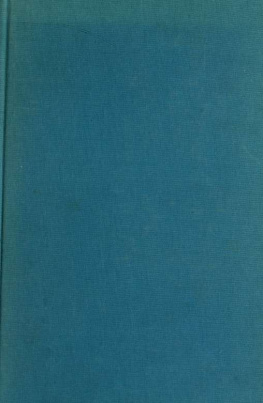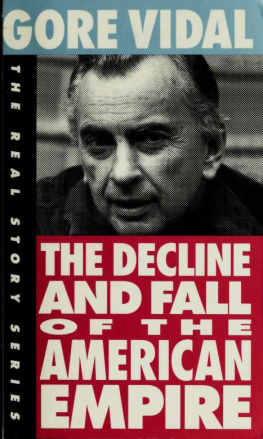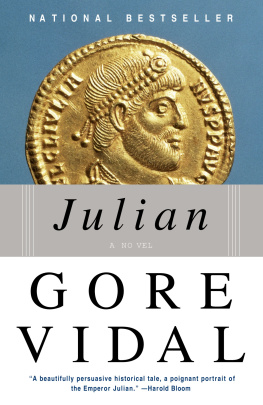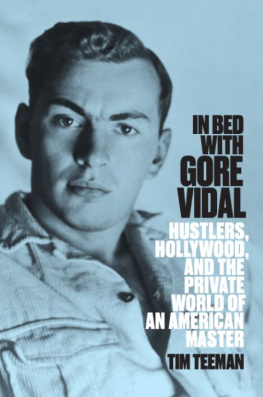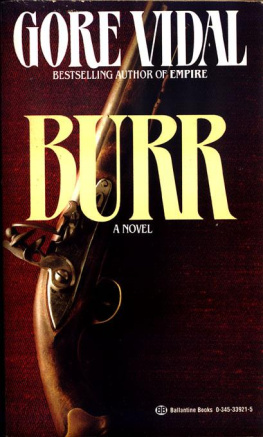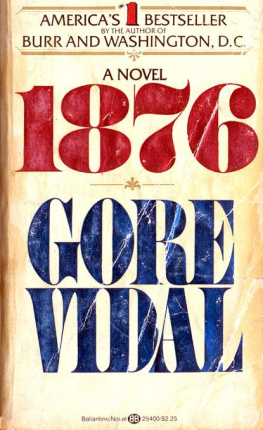A collection of original interviews with acclaimed author Gore Vidal conducted by Paul Jay, Senior Editor of The Real News Network Includes a collection of original photographs
Acknowledgements i Foreword 1 Paul Jay Visiting Gore Vidal 13 The Cold War 22 The Emperor 25 On Liberty 30 U.S. Media and Society 34 Democrats and Religion 38 The Future 41 The State of Media and The Real News 45 The History of The National Security State50 Hollywood and Washington 87 Gore Vidal at The Real News FundraiserLos Angeles 2005 130
Thanks to all The Real News Network volunteers who helped make this project possible.
Michael Trudeau Alan Marwine Sue Tinkle
Edgar NelsonTeo Newman
i
FOREWORDI met Gore Vidal in the spring of 2004 at his house in Hollywood. At the time I was organizing an
international advisory committee in the early days of creating Independent World Television, which we later renamed The Real News Network.
Gore had agreed to give me twenty minutes. Two bottles of scotch and five hours later, he had told me the story of his relationship with his soul mate, Howard Austen. I asked him when we could talk about my plans for a news network. He waved his hand in his exaggerated regal fashion and said, Who knows. He said he was off to Italy in a couple of days and if I wanted to talk further, Id have to see him there. From the very start of The Real News I wanted Gore Vidal to be involved, so in July, I went to southern Italy.
Gore was sitting on the terrace of La Rondinaia, his cliff-top villa overlooking the Gulf of Salerno, down the coast from Naplesits a stunning view. The red roofs of the town of Amalfi sit hundreds of feet below, with an expanse of deep sapphire sea as far as one can see. Vidal spent most of the last thirty years there in his beloved town of Ravello.
He talked about the confusion he felt since the death of his companion Howard Austen a year earlier.For fifty-three years I had some idea who I was, in relationship with Howard. Now, Im not so sure.At one point in our conversation, Gore leaned over to make a phone call, then sank back into his chair.I was about to call Howard.
He will soon part with the second love of his life, this Renaissance-style villa where he lived the life of an expat and hosted people like Greta Garbo, Princess Margaret, Tennessee Williams, Hillary Clinton, Sting, Mick and Bianca Jagger, and Sophia Loren.
Hes done most of his writing over the last three decades in a wood-paneled study filled with books and photos.
I run into Howards ghost in every room. I talk to him, but he doesnt answer.I didnt expect the raw and open way he expresses his emotions.
Im sufficiently Greek in attitude to be stoic, and toknow that if you are too happy you will be struck down. Thats what happened. I suppose I knew it was coming and was more or less prepared but you never really are. Its pretty grim living here alone, so its time to go.
About to start his eightieth year and hobbling around on a bum knee, Vidal was not just leaving this house. He was returning to the United States, whose history and politics are his real lifelong passion.
He went back because he thought his country was in danger.
Im a battleship, he said. Im an operator. Im a destroyer, Im meant for war. He stopped for a long pause. But I dont know if I can do it anymore.
For most of his life, Vidal waged a struggle against what he calls the United States of Amnesia. Throughout a prolific career of celebrated novels, film scripts, and essays, he explored Americas past, unraveled its national psyche, and railed against its misdeeds.
Most of all, its been a fight against the hypocrisy ofthose who talk democracy but are more interested in the defense of property.
He comes from a ruling family (he counts Al Gore and Jackie Kennedy as kin). His father, Eugene L. Vidal, served as the first director of the Bureau of Air Commerce in the Roosevelt administration (and appeared on the cover of Time in 1933).
Gore knew presidents and princesses, celebrated writers and billionaires. Through his work he
accumulated a significant amount of wealth and he lived very well. Yet his criticism of American society was no less compromising than that of a Chomsky or a Zinn.
He was a genuine class traitor. Vidal could have lived an easier and more celebrated life if he just kept his mouth shut. Instead, his attacks on the American empire grew fiercer through the end of his life.
The next national trauma will be a sharpening of class struggle. [John] Edwards got on the national ticket by noticing something thats perfectly obvious, that there are two Americas. There are those that have and those that have not. That used to be consideredcommunist propaganda. But it is the condition in most countries most of the time, and in the United Statesmore than ever.
We headed out to the main square of Ravello, and Gores new knee required him to use a wheelchair for part of the trip. Settling in at his favorite bar, we watched beautiful sultry women and men circling each other in front of the cathedral of San Pantaleo.
The scene reminded me of a Vidalism: A narcissist is someone better looking than you are.
Streams of well-wishers, a few with raised fists in theclassic anti-fascist salute, paid their respects. Gore was a hero to the European left.
We settled into more scotch. Its a great scandal ofthe CEOs, who are simply bandits. They go into a company that had a rich base, grab everything they can for themselves, stock options, huge salaries, fire as many people as possible. If we ever have an oldfashioned revolution in the United States, it will be made by well-educated blue-collar workers who have lost their jobs.
Someone at our table pointed out that there didntseem to be a sign of thismuch of the working-class votes for Bush.
Because the bandits own the media, said Gore. And the media tells them that America is the greatest country in the world. Well, it sure as hell isnt, at least not for the people who live in it. But the media are there cheerleading, These are the greatest guys onearth. The infantilizing of the republic is one of the triumphs of American television.
Gore is a man who knew media from the inside. From Hollywood, where he wrote hits like Ben-Hur, to a series of best-selling novels, to countless television appearances, he was one of Americas great celebrity intellectuals for half a century. His transition frommedia darling to extremist outsider mirrored theprocess of his own radicalization. While he was much sought after around the world, there was very littleroom for Gore Vidal in print or on television in his own country.
When Vidal broke through as a novelist in the lateforties and early fifties it was at the beginning of Cold War propaganda and McCarthyism. The American people were now being systematically terrified by thecountrys ownership. I believed the whole nonsense, he writes in his memoir, Palimpsest. But he was starting to wake up. My real political education began when I made money only to have it confiscated by a military machine. This confiscation of ones hard-earned money did not drive me into the right wing, as it did RonaldReagan, who was as indignant as I but chose to blame it all on a vague nemesis called big government. I started to turn left. If the government was going to take so much of our money, then let the government give us health care, education, and all those other things first-world countries provide their taxpayers.



